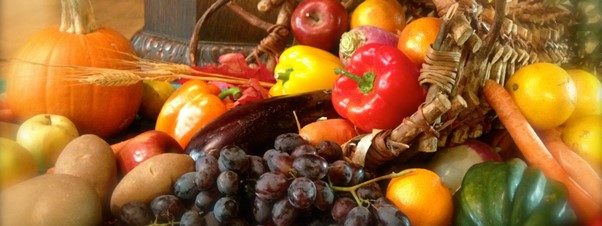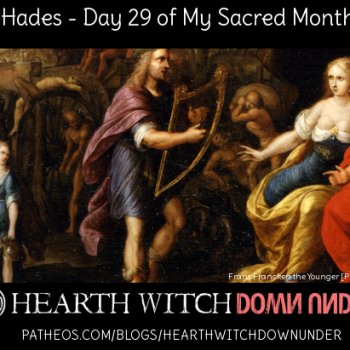My last post was about animal sacrifice in Hellenism, both from history and mythology and from today. In this post we are going to look at other types of offerings.
In ancient Hellenism the act of sacrificing an animal was generally the job of the priesthood and usually not done by people within their own household practice. But household worship and honouring of the Gods was a daily practice, involving various levels of elaborateness. Animal sacrifice, and the offering of meat was not generally part of household practice – as we established in the previous post, meat was not a general commodity in ancient Greece so of course it wasn’t really part of common household practice. This means, that within household and personal practice, there must have been other offerings made and given, other things done.

Non-Meat Meats
Though we consider fish to be meat, in much the same way we consider any animal meat, it seems to have been of a different calibre in the eyes of the ancient Hellenes. It’s not exactly something that could be sacrificed, getting a fish to survive long enough to take it to the altar and then go through the sacrificial procedure – well I don’t see that happening.
Fish was a regular staple in the Hellenic diet, at least for those who lived near to the sea or other fishy areas. So it was that fish was also a common offering in Hellenic worship – it was, in many cases, readily available and specific types of fish were sacred to specific deities, making them perfect as offerings to those deities. Poseidon of course was one who would be offered fish, and Hekate also was offered fish on the Deipnon.
In modern times fish is certainly a good offering for those who are okay with animal products, and given that the act of fishing is a pretty common pastime for many people, it is perhaps not too difficult an offering to manage. Whether it is okay to use frozen of tinned fish though is perhaps up to the individual. Personally, I can’t say how I feel about it, because I haven’t really thought about it. But I can see that some would be against it, and some would be okay with it – as seems to be the case with most such adaptations.
Another product that is meat like but not exactly meat and certainly cannot be offered in sacrifice is egg. Now I know that eggs are great offerings for Hekate, and they are also good to offer to various fertility deities – but I am not sure of how prevalent they were as offerings otherwise. I do know, however, that they weren’t much of a food staple and even when they did begin to be used for food, they weren’t in very high regard.
Natural Foods
Of course natural foods such as fruit, vegetables, grains and the like were the most common of offerings. To see what might have been considered common one need only look at the common Hellene diet to get an idea of what may have been offered to the Gods.
Olives, Grapes and Honey
Olives, grapes and honey seem, to me at least, to be of equal importance and popularity among the ancient Greeks. On a mundane level, they are obviously of great value for numerous reasons. They each have value in trade, of course but they also serve as food items. Olives of course create oil, grapes create wine and honey has some great medical properties. I suppose all three can also be used in beauty products as well, which just increases their value even more. Considering all of this, one can see why they were and continue to be of such import in Greece.
But of course, the mundane wasn’t the only reason these served to be important – they also have their places in mythology and they are sacred to the Gods, some Gods more than others, but in truth as offerings these three are pretty much universal and can be offered to any deity among the Theoi.
Honey was and still is often referred to as the “nectar of the Gods” and was considered to be ambrosia. Zeus Himself is said to have been fed honey and milk when He was growing and in hiding from His father, the titan Kronos. Grapes of course create wine, and we should all know the importance of wine to many of the Gods, most notably Dionysos.

So, olives, grapes and honey are perfect Hellenic foods and products. When it comes to offerings they are, in essence, the go to foods. Honey by itself, mixed with anything, or cooked into things like cakes, breads and cookies. Olives by themselves or cooked into foods, like breads and cake or whatever you might conceive of and of course you can make a lot of foods with olive oil – olive oil is also used in libation. Grapes, again by themselves, or perhaps added into other foods, but best used in libation as wine, or grape juice for the teetotaller.
As a note, wine, when offered to most deities, should be mixed with water. Only when offered to Chthonic deities can it be offered straight – I suspect this partially because we are supposed to drink the remnants of libations to most deities, and drinking unmixed wine was considered barbaric, but we do not partake of anything when offering to Chthonic deities so it can be unmixed.
Barley
Though not as interesting as honey, grapes and olives, barley was also of great import to the ancient Greeks. It was their main grain crop and was a food staple as well as a great offering to the Gods, but perhaps of most importance, it was also a purifying product. Barley was not just common as a universal offering in Hellenism, it is also scattered over the altar and even on people (and sacrifices) to purify them in addition to khernips.
So we can use barley as a basic grain offering, and for purification purposes. We can also use barley flour in baking and cooking, to create more elaborate offerings in cookies, cakes and breads. Much like honey, grapes and olives, barley is versatile in our practice.
So Much More
I can’t go through and list everything that was and is offered regularly, along with the whys, as that would take way too long and in truth I think it is not really necessary. When it comes down to it, you can offer pretty much any natural food the Gods, any fruit or vegetable or grain should be perfectly okay.
But it should be noted that the Gods are more receptive to the foods that are considered sacred to Them in some way. So, whilst olives are a universal offering, they will have greater affect when offered to Athena specifically. Hekate is more receptive to Her specific foods such as garlic and leek. Pomegranates are said to be great for Persephone/Kore. It is also of course possible that the opposite can happen – that a specific food is, well, offensive to a specific deity. So, I certainly suggest checking up on the lore of the specific deities you are offering to before deciding to just offer whatever is at hand.
















